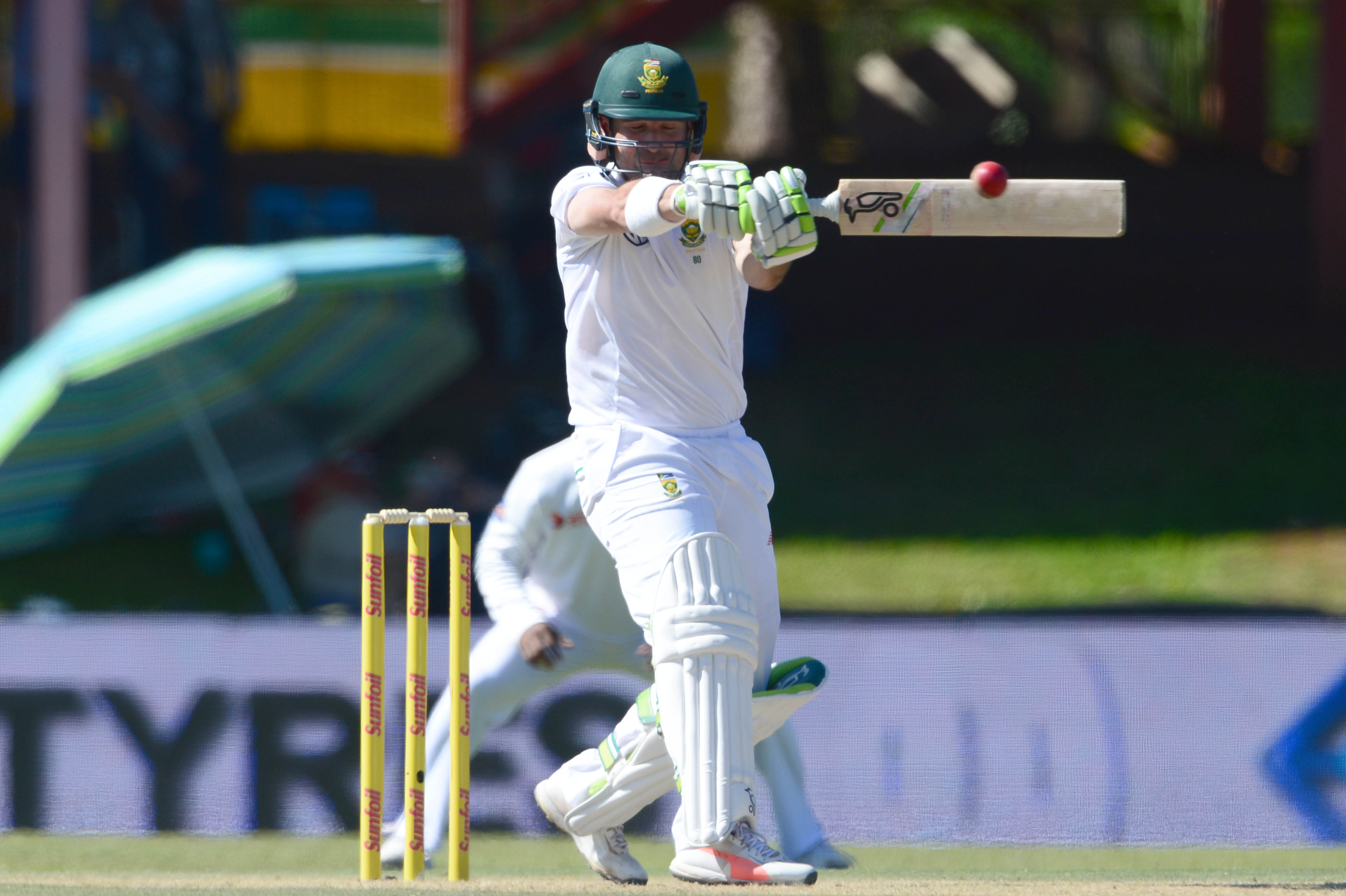Dean Elgar has been a good batsman who has played great knocks — but that will no longer suffice
On March 4, 2021, Cricket South Africa officially announced that Dean Elgar would be taking over as the captain in Test cricket. It was a decision that surprised none; if anything, CSA made the call two years too late. But if this rebuild is to be successful, Elgar would need to up his game.

A year ago, SportsCafe did an in-depth analysis on why Dean Elgar was simply not as good as the world portrayed him to be, and argued why he was living in the glory days of his past. Elgar, at the time of writing, had averaged 38.49 after 63 Tests and was in the midst of a dip. But things have since changed - slightly, at least.
The 33-year-old has since played 4 Tests, and, to his credit, has managed to get his career average up to 39.81. Elgar has, over the past year, averaged 62.00 in Test cricket and has shown glimpses of getting back to his 2017 self, a year in which he averaged 53.71 and struck 5 tons in just 12 Tests. Two months ago, he was handed over the Test captaincy by the South African board and in two days’ time, Elgar, for the first time in his career, will be taking charge of the Proteas as a full-time skipper.
But if Elgar’s time at the helm is to be successful, and if the Proteas are to get back to being spoken in the same breath as India, Australia, England and New Zealand, they would need something that has not happened since 2016: have their skipper carry the team on his shoulders and lead from the front with the bat.
Faf du Plessis’ time as the South African Test skipper, which began back in 2016, came to an ugly halt post the end of the England series last year. But as much as his resignation was down to abhorrent results - du Plessis lost 12 of his last 18 matches as Test skipper - the right-hander’s shocking returns with the bat accelerated his exit. After starting his tenure off by striking a match-winning ton in just his second Test as skipper, versus the Kiwis in Centurion, du Plessis’ returns started to diminish after a six-month honeymoon period, post which he became a liability. Staggeringly, across his last 18 Tests as skipper, dating back to January 2018, du Plessis averaged a mere 26.93 and struck just two tons, both of which came at home. In the said period he averaged 24.70 away from home, a phase in which the Proteas did not win a single Test outside South Africa.
Du Plessis exited having set the bar really low, but his successor Quinton de Kock, somehow, managed to drag the bar down even lower. De Kock skippered the Proteas in only four Tests, but his returns turned out to be hideous. 12.33 was all he averaged across four Tests, and scathingly he failed to contribute in the two-Test series away in Pakistan, in which the Proteas had a realistic chance of scoring a W.
Thus, technically, Elgar will embark on his journey as skipper without any big shoes to fill, knowing very well that it’d be impossible for him to fare worse than his predecessors, who failed to inspire any confidence - with the bat, at least.
But with CSA having turned to ‘Project Elgar’ with the vision of rebuilding the side, the newly-appointed South African skipper faces a dire need of not just leading from the front with the bat, but improving his own numbers, which have, of late, been deceptively good. For Elgar still is, contrary to the popular perception, far from being world class.
There is little question that, across the past four years, Elgar has by some distance been South Africa’s best Test batsman (well, excluding AB de Villiers, of course). The newly-appointed Proteas skipper has, since the start of 2017, scored nearly 700 runs more than any other South African batsman and is only one of two active Proteas batsmen to have averaged over 40 during this period. Even if you take away Elgar’s best year, 2017, he still averages 36.50 since 2018, the best among all active Proteas batsmen. Yet while these numbers make him stand out among a pool of average-at-best batsmen, Elgar is far from being one of the best openers in the world - at least post 2017.
Since 2018, Elgar averages 36.50 in Test cricket. Among all openers to have scored a minimum of 500 runs during this period, it stands only as the ninth best. His numbers are still respectable, but what’s concerning is that of the nine batsmen, no one has a worse innings-per-hundred ratio than Elgar, who has struck just three tons in 25 Tests.
The aforementioned list is not straightforward, true. For instance, each of the top four batsmen in the list have scored almost all their runs at home, and South Africa is one the tougher places to be an opener. Since 2018, openers in South Africa have averaged just 32.62, a figure lower than the likes of India, New Zealand, Pakistan and Sri Lanka.
But to use ‘tough conditions back home’ as an excuse for Elgar’s shortcomings would be naive. Both David Warner and Tamim Iqbal, who have also scored a bulk of their runs at home, have batted in places that have been, at least statistically, tougher to open in than South Africa and have yet managed to average more than the South African. Dom Sibley and Rory Burns, last year, averaged 54.00 and 46.50 respectively, in South Africa, and Cameron Bancroft in 2018 (37.16) almost matched Elgar’s home average of 38.90.
But even removing all caveats, Elgar’s dismal record away from home over the past three years is a damning indictment of how average he has been. In 7 tests away from home since 2018, Elgar has averaged a mere 30.76, a figure lower than that of Lahiru Thirimanne, Keaton Jennings and Tamim Iqbal.
That his numbers have been middling is evident, so how and why, then, has he continued to be considered one of the more ‘underrated’ openers in world cricket? As was pointed out in the article we’d written last year, the reputation Elgar has built - that of being a warrior who scores tough runs - has shielded him. But even in ordinary stretches, Elgar slips in world-class knocks that ultimately end up masking the string of failures.
The numbers tell us that Elgar, for the past three years, has only been a good opener, not great. He has, however, played great knocks that have reaffirmed the belief among many that he’s one of the best in the world. Consider the three-match series against India in 2019 which the Proteas lost 3-0. Elgar, in that series, registered a solitary fifty-plus score and failed to pass 20 in all but two innings in the series. Yet the 160 he scored in the first Test in Vizag - a genuinely world class knock - elevated him to a level that people were willing to overlook the fact that he only averaged a mere 18 across the rest of the series.
A similar situation unfolded in the 3-1 series loss to England at home. The 88 Elgar struck in the second Test in Cape Town was his only fifty-plus score of the series (he averaged 22.28 in the series minus that knock.), yet so compact and well-compiled was that 88 that the fact that he never passed fifty in any of the other knocks completely slipped under the radar.
But these are not mere freak occurrences. For, remarkably, throughout the course of his Test career, Elgar’s performances away from home have followed a ‘one and done’ pattern wherein he’s played one world class knock per series and no more. The one knock, though, has always tended to be so impactful - at least in the eyes of fans - that it has completely shielded him from any criticism for not being consistent.
4:58
In fact, not just away, against the big three - India, Australia and England - Elgar’s scores have followed a eerily similar pattern even at home.
The numbers tell us one thing: consistency, particularly against the big sides, has been Elgar’s kryptonite. He did manage to elevate himself to a new level in 2017, but it is worth noting that his statistics, in that particular year, were inflated by the home series against Bangladesh in which he struck 330 runs in 3 innings, averaging 110.
And thus as Elgar embarks on his journey as captain, it goes without saying that his biggest challenge will be not just scoring big runs, but doing so on a consistent basis. Tonning up against the Windies in the first Test in St.Lucia will be a step in the right direction, but while a big knock might help him keep his reputation intact, failure to back it up with more consistent scores will ultimately be of no use to South Africa’s long term progress.

Comments
Sign up or log in to your account to leave comments and reactions
0 Comments